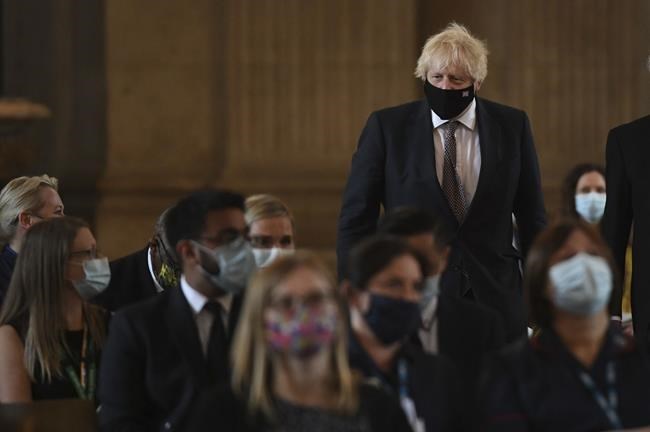LONDON (AP) — British Prime Minister Boris Johnson confirmed Monday that his government plans to scrap laws requiring face masks and social distancing later this month, though he acknowledged that lifting the restrictions will drive surging coronavirus cases even higher.
Johnson said legal controls will be replaced by “personal responsibility” when the country moves to the final stage of its lockdown-lifting roadmap. That is scheduled to happen on July 19, though Johnson said a final decision would come on July 12.
The change will mean people can throw away masks after months of enforced face-covering, though businesses and transit operators may still require them, and they will still be recommended in some enclosed spaces.
The removal of social distancing rules will allow nightclubs to reopen after 16 months of enforced shutdown, and patrons to once again order drinks at the bar in a pub. No longer will customers have to scan a phone app to provide their contact details when entering a restaurant or bar.
The government will also stop instructing people to work from home if they can, leaving employers free to bring staff back to offices.
The changes apply in England. Other parts of the U.K. — Scotland, Wales and Northern Ireland — are following their own, broadly similar, road maps out of lockdown.
Britain has recorded more than 128,000 coronavirus deaths, the highest toll in Western Europe, and infections are rising due to the highly transmissible delta variant of the virus. Confirmed cases have shot up from about 2,000 a day earlier this year to 25,000 a day in the past week. But the number of deaths is broadly stable, at fewer than 20 a day.
Public health officials say Britain’s vaccination program has weakened the link between infections and deaths, though not severed it. So far, 86% of U.K. adults have received at least one vaccine dose and 64% are fully vaccinated. The government aims to give everyone over 18 both shots by mid-September.
Johnson acknowledged that infections, hospitalizations and deaths will all rise once remaining restrictions are lifted.
“I want to stress from the outset that this pandemic is far from over,” he said, predicting that cases could hit 50,000 a day by July 19. “We must reconcile ourselves, sadly, to more deaths from COVID.”
Johnson said Britain would have to “learn to live with this virus” — a major shift in tone from a leader who has previously painted COVID-19 as an enemy to be vanquished.
That message will be welcomed by lockdown-skeptic lawmakers in Johnson’s governing Conservative Party, who say the economic and social damage of restrictions outweighs the public health benefits, and Britain’s populist press, which have dubbed July 19 “freedom day.”
But public health officials and scientists have urged caution, saying ditching masks and social distancing altogether could be dangerous. Psychologist Stephen Reicher, a member of the government’s scientific advisory committee, said “proportionate mitigations” against the spread of the virus should stay in place.
“I think we need very clear messaging and I think in certain spaces — crowded, badly ventilated spaces — masks are crucial mitigation,” he told the BBC.
The British government, which enforced one of the longest lockdowns in the world, has lifted restrictions for England in a series of steps that began with reopening schools in March. The fourth and final stage was delayed last month to provide time for more people to be vaccinated amid the rapid spread of the delta variant, which was first discovered in India.
Jonathan Ashworth, health spokesman for the opposition Labour Party, said the government should exercise more caution.
“We’re not out of the woods,” he said. "We want to see the lockdown end but we need lifesaving mitigation in place. We still need sick pay, local contact tracing, continued mask wearing, ventilation and support for children to prevent serious illness.”
Paul Hunter, professor in medicine at the University of East Anglia, said it made sense to ease restrictions in summer, when schools are closed, people spend more time outdoors and other respiratory infections are at a low level.
“The disease burden associated with a larger peak during the summer would likely be less than one during the winter,” Hunter said.
But Richard Tedder, a virologist at Imperial College London, said easing up while infections are still rampant “comes with the very real risk of facilitating the escape of variants which will be even more resistant to vaccines and potentially more infectious.
“Failing to recognize this is playing with fire,” he said.
___
Follow AP’s pandemic coverage at:
https://apnews.com/hub/coronavirus-pandemic
https://apnews.com/hub/coronavirus-vaccine
https://apnews.com/UnderstandingtheOutbreak
Jill Lawless, The Associated Press

